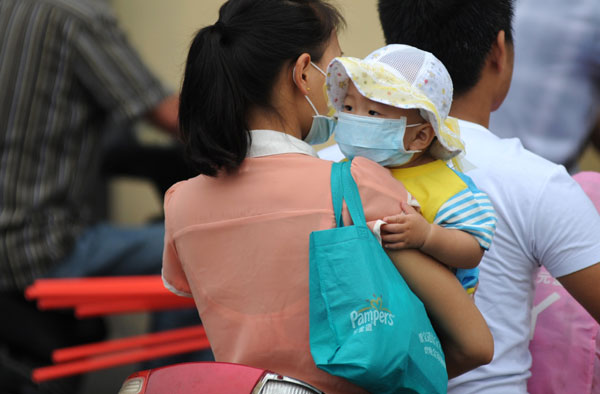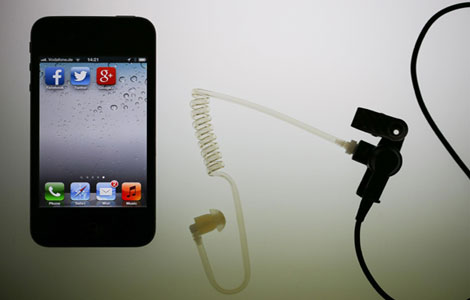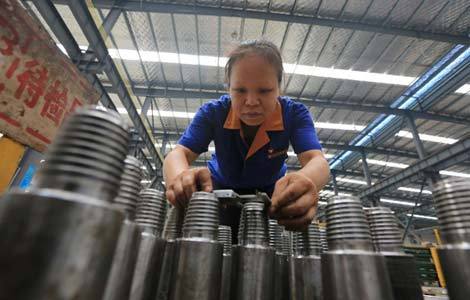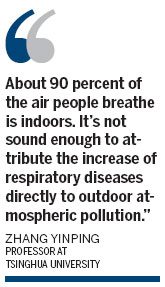Lifestyle changes may hike child asthma cases
Updated: 2013-07-16 09:52
By Wang Qingyun (China Daily)
|
||||||||
To keep her 7-year-old daughter's asthma under control, Zhang Yun has already gotten rid of her stuffed toys, and her room is fitted with an air purifier which cost about 3,000 yuan ($488.7).
Yet the mother realizes she is powerless when it comes to the air outside.
 |
|
A woman and her child protect themselves from pollution in Zhengzhou, Henan province, in June. Deng Yinming / for China Daily |
"She sneezes and coughs when the air quality is not good," she said. "Sometimes my daughter sneezes so hard her nose bleeds."
Zhang is among the many parents in Beijing and other Chinese cities who worry that the increasing air pollution may worsen their children's condition.
In the past two decades, the prevalence of child asthma has risen significantly. But experts are cautious over what role pollution has played.
A survey found that national prevalence surged from 1.09 percent in 1990 to 3.01 percent in 2010, with 23 cities indicating an increase in all three surveys, in 1990, 2000 and 2010.
The prevalence of asthma among children under 14 in Beijing is 3.68 percent, up from 0.88 percent in 1990 and 2.69 percent in 2000, while in Shanghai it has risen from 1.79 percent in 1990 to 7.57 percent in 2010, higher than any other city surveyed that year.
Liu Chuanhe at the Capital Institute of Pediatrics in Beijing, who helped conduct the survey, said changing lifestyles has been a definite cause for the increase.
"In Beijing, we found most children diagnosed with asthma were allergic to mites and mold, some to pollen or animal fur," he said.
"We enjoy air-conditioning in summer and heating in winter, so people barely open their windows and doors to ventilate their apartment. This makes it easy for mites and mold to grow, like on pillows, sheets and in the air conditioners."
Also, consumption of high-protein foods increases the risk of allergies in children, including asthma, Liu said.
He dismissed suggestions that air pollution alone is responsible for the increase.
"The link increasing asthma to worsening outdoor air pollution has not been confirmed," Liu said. Pollution, such as particulate matter and sulfur dioxide, has not been proven to trigger new asthma cases in children, he said.
"However, the air pollution can worsen the recovery for children with asthma," he said. "During smoggy weather, more parents take their children to me than usual.

 Putin wants Snowden to go, but asylum not ruled out
Putin wants Snowden to go, but asylum not ruled out
 Apple to probe death of Chinese using charging iPhone
Apple to probe death of Chinese using charging iPhone
 Investment falters as industrial activity flags
Investment falters as industrial activity flags
 Rape victim's mother wins appeal
Rape victim's mother wins appeal
 Reproduction of 'Sunflowers' displayed in HK
Reproduction of 'Sunflowers' displayed in HK
 Land Rover enthusiasts tour the world
Land Rover enthusiasts tour the world
 US star sprinter fails drug test
US star sprinter fails drug test
 Protests erupt after verdict
Protests erupt after verdict
Most Viewed
Editor's Picks

|

|

|

|

|

|
Today's Top News
China calls for new talks on Iran nuclear issue
Global warming may largely raises sea level
Putin wants Snowden to go, asylum not ruled out
Trailblazer reaches out to inmates on death row
Air crash payouts could differ
Cabinet promises more funds for smaller firms
Capital prison tests therapy on inmates
Regulation to improve public organ donations
US Weekly

|

|








